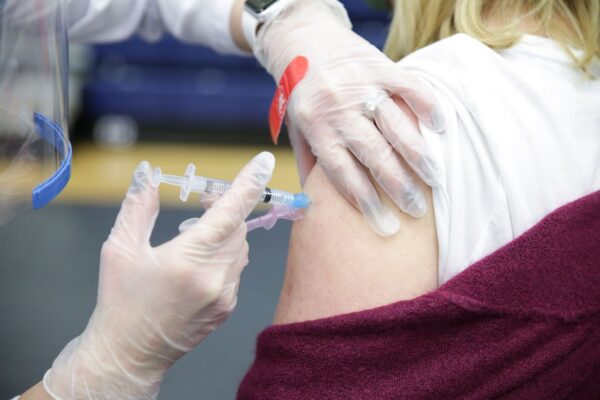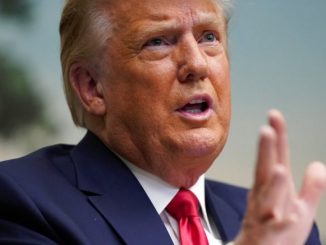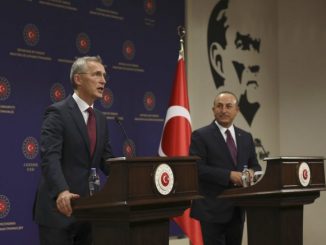
Hundreds of New Jersey students and parents held a rally on Friday outside Rutgers University in New Brunswick, N.J., to protest the school’s COVID-19 vaccine mandate for students.
In collaboration with Young Americans for Liberty and Turning Point USA, a medical freedom advocacy group, NJStandsUp, organized a rally in response to the university’s new requirement—introduced in March—that all students enrolled for in-person classes in 2021 fall semester must be vaccinated for COVID-19.
The mandate did not apply to students enrolled in fully remote online programs and it allowed students to ask for an exemption from vaccination on medical or religious grounds, according to a statement.
The university’s faculty and staff were not required to get vaccinated against COVID-19, but Rutgers’ executive vice president and chief operating officer, Antonio Calcado strongly urged them to receive the vaccine, the statement said.
In response to the mandate, New Jersey lawmakers proposed bills to prohibit forced vaccination and discrimination of unvaccinated individuals.

New Jersey Assemblyman Gerry Scharfenberger (R) has introduced in May a bill to prevent usage of vaccine passports and prohibit discrimination against individuals who have not received the COVID-19 vaccine.
The bill, also sponsored by two other Republican Assemblymen, Gregory McGuckin and John Catalano, seeks to “combat the implementation and the very notion of mandating individuals acquire ‘vaccine passports’ before taking part in common societal activities as well as preventing the discrimination of those who do not wish to disclose such information,” Scharfenberger said in a statement.
The legislation makes it unlawful to ask a person whether they received a vaccine against COVID-19, a disease caused by the CCP (Chinese Communist Party) virus, commonly known as the novel coronavirus.
It also prohibits any individual who has not received a COVID-19 vaccine from being denied a right to conduct any business, to travel, to receive health care services, receive education, enter any place of business, such as a store or restaurant, any public place, or to attend any entertainment or sporting event.
The bill also prohibits any discrimination against those who do not disclose whether they received COVID-19 vaccine or not.
New Jersey Assemblywoman Serena DiMaso (R) introduced a bill (pdf) prohibiting colleges and universities that receive state or local funding from mandating COVID-19 vaccines or discriminating against students who have not received the vaccine.
When speaking at the rally, Scharfenberger warned that every time people pull back some of their freedom, even if only temporarily, it is gone forever. “You will never get it back,” he added.
“Allowing them to mandate vaccines to get into Rutgers University is a slippery slope. They’re going to keep moving the goalposts until they dictate every aspect of your life,“ Scharfenberger continued.
To prevent this, Scharfenberger called on rally attendees to ask their legislators to co-sponsor his bill and have them demand to bring the bill into the floor for a vote.
He also encouraged the audience to vote in the upcoming November election saying that 70 to 80 percent turnout is needed to exercise people’s power.
New Jersey Senator Michael Testa Jr. (R) said, “How can they mandate students get the vaccine but not the faculty?” and called it hypocrisy. Testa also urged the audience to contact their legislators, “inundate their offices with letters, emails, show up like today—not just on these issues, on every single issue.”
Phil Rizzo, who is running as a Republican for governor of New Jersey, said at the rally that if he gets elected, his administration will send a message to Rutgers that if it does not drop its vaccine mandate, the state will pull $1 billion from the university until the students’ liberty is assured.
“I trust New Jersey residents and business owners and parents to make decisions for themselves with their doctor to keep themselves healthy,” Rizzo said, adding, “It’s not the government’s job to keep you healthy. It’s the government’s job to keep you free.”
Medical Community Reacts

“The COVID-19 vaccines have proven to be safe and effective in preventing serious illness, hospitalization, and death,” Brian Strom, chancellor of Rutgers Biomedical and Health Sciences and executive vice president for health affairs, said in the statement. “Vaccination is key to stopping the current pandemic and to the return of campus instruction and activities closer to what we were accustomed to before the pandemic,” he added.
However, members of the medical community and activists expressed their concerns over the directive.
Dr. Hooman Noorchashm, Ph.D, a physician-scientist and an advocate for ethics, patient safety, and women’s health, sent an open letter to Rutgers warning of a potential safety risk of the COVID-19 vaccine.
While Noorchashm agrees in his letter with the university’s policy to ensure maximum immunity for all students and faculty, he raises concerns about administering the vaccine to students who achieved natural immunity.
Natural immunity can be developed through contracting COVID-19 and the percentage of naturally infected individuals could be higher in the population of college-aged persons, the letter stated. “Some experts believe that natural immunity may even be more robust than vaccine immunity—but at least equally effective in the vast majority of those naturally infected,” Noorchashm said.
Therefore Noorchashm advised to exclude those naturally immune students from mandatory COVID-19 vaccination, deeming the procedure unnecessary for this group.
Moreover, “indiscriminately vaccinating persons with recent COVID-19 infections poses a risk of clinical harm to recently infected persons. There have been some very prominent young deaths following vaccination—and it is becoming clear that adverse event [reaction] rates are higher in the previously infected,” Noorchashm said.
Natural immunity can be detected through tests for antibodies presence, Noorchashm added.
The Association of American Physicians and Surgeons (AAPS) issued an open letter to universities asking them “to reconsider [their] new policy mandating COVID-19 vaccination of students prior to returning to campus.”
The letter signed by Dr. Paul Kempen, Ph.D., AAPS President, stated that the three COVID-19 vaccines that were granted Emergency Use Authorization (EUA) by the Food and Drug Administration (FDA) “are not FDA approved to treat, cure or prevent any disease at this time.”
“Clinical trials will continue for at least two years before the FDA can even consider approval of these vaccines as effective and safe,” the letter stated.
The Association also stated in the letter that positive COVID-19 test results “may be false-positive testing errors or asymptomatic infection that is not clinically proven to spread disease.” There is outpatient early treatment for the disease that “has been demonstrated effective in adults,” the letter stated.
“Both unvaccinated and vaccinated students should be permitted on campus,” the letter concluded.
Robert F. Kennedy, Jr. chairman of Children’s Health Defense, sent a letter to Rutgers President Jonathan Holloway raising legal concerns over mandated vaccination because COVID-19 vaccines currently available received only Emergency Use Authorization.
Federal law requires that the person to whom an EUA vaccine is administered be advised, “of the option to accept or refuse administration of the product,” Kennedy quoted from the law in the letter. “The reason for the right of refusal stems from the fact that EUA products are by definition experimental,” Kennedy explained.
“Under the Nuremberg Code, no one may be coerced to participate in a medical experiment,” Kennedy said, warning Rutgers about “the liability for forced participation in a medical experiment.”
The Nuremberg Code was created after World War II and sets the standard for regulating human experimentation.
Dory Devlin, senior director of media relations at Rutgers told The Epoch Times via email: “We are committed to creating a safe campus environment in fall 2021, and to support the health and safety for all members of the Rutgers community, the university has updated existing immunization requirements for students to include the COVID-19 vaccine. The university’s position on vaccines is consistent with the legal authority supporting this policy.”
The Centers for Disease Control and Prevention (CDC) stated on its website that COVID-19 vaccines “are effective at preventing COVID-19 disease, especially severe illness and death … and reduce the risk of people spreading COVID-19.”
The CDC is still learning about how effective the COVID-19 vaccines are against variants of the virus, how well the vaccines protect people with weakened immune systems, and how long they can protect people, the website said.





Be the first to comment